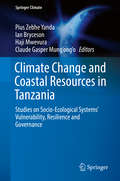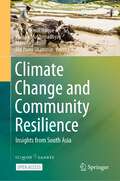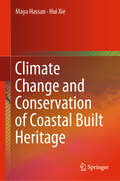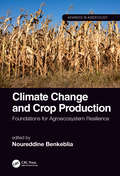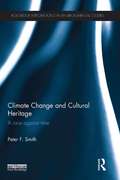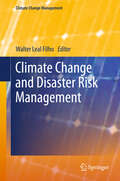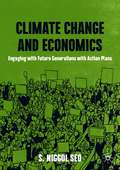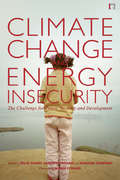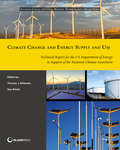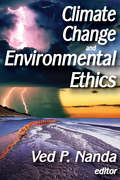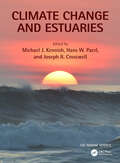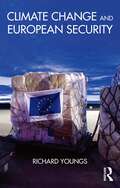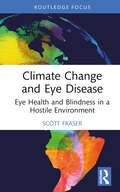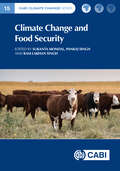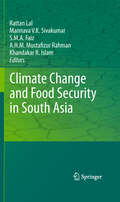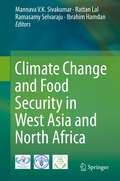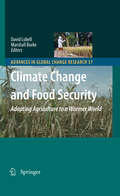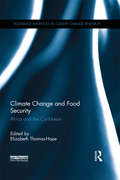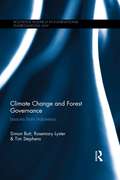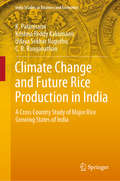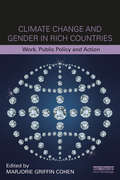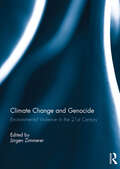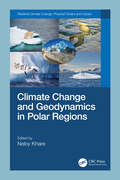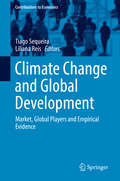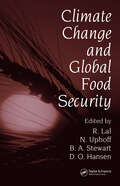- Table View
- List View
Climate Change and Coastal Resources in Tanzania: Studies on Socio-Ecological Systems’ Vulnerability, Resilience and Governance (Springer Climate)
by Pius Zebhe Yanda Ian Bryceson Haji Mwevura Claude Gasper Mung'Ong'OThis volume synthesizes research from a five year program supported by the Norwegian Agency for Development to assess how coastal communities in Tanzania can adapt to climate change impacts such as sea level rise, and better assert their rights to implement decisions regarding coastal resource management in the context of global climate change. Throughout ten chapters, the book deploys a holistic approach to adopt a conceptual model of socio-ecological systems, and characterize human-nature interactions in an integrative way to understand anthropogenic pressures on ecosystems to guide conservation and management. The book will be of interest to researchers, students studying environmental management and climate change, planners, and policy makers. The book begins by describing the biophysical and socio-economic characteristics of the Tanzanian coastal environment, then discusses the impacts of climate change on coastal resource governance, community vulnerability, and livelihood security. Then, intervention strategies are offered as a means for local communities to not only adapt to climate change impacts, but also to engage in decision-making processes to assess vulnerabilities and address challenges and limitations through educated measures. The final chapters discuss the vulnerability and adaptation of coastal communities to climate change impacts to assess how livelihoods are constructed in response to impacts, and summarize the key findings to determine the best adaptation strategies to improve adaptive capacity and reduce socio-economic vulnerability.
Climate Change and Community Resilience: Insights from South Asia
by Pranab Mukhopadhyay A. K. Enamul Haque Mani Nepal Md Rumi ShamminThis open access book documents myriads of ways community-based climate change adaptation and resilience programs are being implemented in South Asian countries. The narrative style of writing in this volume makes it accessible to a diverse audience from academics and researchers to practitioners in various governmental, non-governmental and international agencies. At a time when climate change presents humanity with a gloomy future, the stories of innovation, creativity, grassroots engagement and locally applicable solutions highlighted in this book provides insights into hopeful ways of approaching climate solutions. South Asian countries have been dealing with the impact of climate change for decades and thus offer valuable learning opportunities for developing countries within and beyond the region as well as many western countries that are confronting the wrath of climate induced natural disasters more recently.SANDEE has been a pioneer in the development of research and training in environmental economics and related issues in South Asia and Prof Maler has been throughout SANDEE's history, its mentor, and its strongest supporter. Many young economists in South Asia have significantly benefited from Prof Maler's guidance and inputs. The present volume on “Climate Change and Community Resilience: Insights from South Asia” is a fitting tribute and an excellent reflection of Prof Maler's contributions to the SANDEE programme throughout his association.- Mahesh Banskota, Ph.D.Professor, Development StudiesSchool of Arts, Kathmandu UniversityThis comprehensive volume aptly identifies grassroots initiatives as the core of the problem of adaptation to climate change. The analysis of the different experiments is lucid, inclusive, and full of interesting detail. The methodologies used and the subjects covered span a range of frameworks and narratives. Put together, the studies are a fitting tribute to Karl-Goran Maler, who spent years putting his impeccable expertise to use for the cause of enhancing research in South Asia.- Kanchan Chopra, Ph.D.Former Director and Professor, Institute of Economic Growth, Delhi, and Fellow, SANDEEThe slow international policy response to climate change elevates the importance of understanding how communities can respond to climate change’s many threats. This unusually accessible volume provides that understanding for South Asia while being relevant to the rest of the world. Its emphasis on research by scholars from the region makes it a wonderful tribute to Prof. Karl-Göran Mäler, who contributed so much to the growth of environmental economics research capacity in South Asia.- Jeffrey R. Vincent, Ph.D.Clarence F. Korstian Professor of Forest Economics & ManagementNicholas School of the Environment, Duke University, USA
Climate Change and Conservation of Coastal Built Heritage
by Maya Hassan Hui XieThis book presents the preservation principles and the current environmental challenges relating to monitoring heritage sites and buildings under the effects of climate change. It provides a clear overview of conservation action levels and the importance of participation and cooperation between them, and discusses evaluation and management methods, thermal comfort for the common usages, and conceptual methods for enhancing the built heritage. The research presented employed the “Zoom In, Zoom Out” approach for monitoring the Syrian coastal heritage sites threatened by the direct and indirect effects of climate change. Lastly, the book establishes the basic principles and conservation strategies for preserving the coastal heritage sites and buildings. As such, it is a valuable reference resource for researchers, developers, architects, and conservators involved in protecting the architectural heritage in coastal areas. It can also be used as a guidebook on preserving and monitoring built heritage sites at both macro and micro levels.
Climate Change and Crop Production: Foundations for Agroecosystem Resilience (Advances in Agroecology)
by Noureddine BenkebliaPresenting an overview of agroecology within the framework of climate change, this book looks at the impact of our changing climate on crop production and agroecosystems, reporting on how plants will cope with these changes, and how we can mitigate these negative impacts to ensure food production for the growing population. It explores the ways that farmers can confront the challenges of climate change, with contributed chapters from around the world demonstrating the different challenges associated with differing climates. Examples are provided of the approaches being taken right now to expand the ecological, physiological, morphological, and productive potential of a range of crop types. Describes the effects and responses of the macro and micro levels of crops under the different components of climate change Reports on the adaptation and resilience of food production systems within the changing climate Covers how plants cope with the changing climate including physiological, biochemical, phenotype, and ecosystem responses Provides an in-depth discussion on the importance of agricultural education connected to climate change Giving readers a greater understanding of the mechanisms of plant resilience to climate change, this book provides new insights into improving the productivity of an individual crop species as well as bringing resistance and resiliency to the entire agroecosystem. It offers a strong foundation for changing research and education programs so that they build the resistance and resilience that will be needed for the uncertain climate future ahead.
Climate Change and Cultural Heritage: A Race against Time (Routledge Explorations in Environmental Studies)
by Peter F. SmithHistory reveals how civilisations can be decimated by changes in climate. More recently modern methods of warfare have exposed the vulnerability of the artefacts of civilisation. Bringing together a range of subjects - from science, energy and sustainability to aesthetics theory and civilization theory - this book uniquely deals with climate change and the ensuing catastrophes in relation to cultural factors, urbanism and architecture. It links the evolution of civilisation, with special emphasis on the dynamics of beauty as displayed in architecture and urbanism, to climate change. It then considers both the historic and predicted impacts of climate change and the threat it poses to the continued viability of human civilisation when survival is the top priority. This book gives students, researchers and professionals in architecture and sustainable design as well as anyone interested in the threat of global warming to civilisation, new insights as to what could be lost if action is not taken at a global level.
Climate Change and Disaster Risk Management (Climate Change Management #0)
by Walter Leal FilhoThere has been some degree of reluctance in the past to consider disaster risk management within the mainstream of adaptation to climate variability and climate change. However, there is now wide recognition of the need to incorporate disaster risk management concerns in dealing with such phenomena. There is also a growing awareness of the necessity for a multi-sectoral approach in managing the effects of climate variability and climate change, since this can lead to a significant reduction of risk. This book presents the latest findings from scientific research on climate variation, climate change and their links with disaster risk management. It showcases projects and other initiatives in this field that are being undertaken in both industrialised and developing countries, by universities and scientific institutions, government bodies, national and international agencies, NGOs and other stakeholders. Finally, it discusses current and future challenges, identifying opportunities and highlighting the still unrealised potential for promoting better understanding of the connections between climate variation, climate change and disaster risk management worldwide.
Climate Change and Economics: Engaging with Future Generations with Action Plans
by S. Niggol SeoThis textbook provides a broad introduction to the relationship between climate change, economics, and climate policy for young readers and future generations. It highlights the problem of intergenerational gaps and burden sharing on climate change. Taking on major contentious issues of today, it is rich with behavioural strategies and real life experiences which are explained in an accessible and engaging way. A diverse range of topics are covered, including farm animals of Sub-Sahara, Latin American rainforests, Indian monsoon agriculture, tropical cyclones in Bangladesh, sublime grasslands, energy revolutions, hydroelectric dams of China, backstop technologies, ocean exchanges with the atmosphere, mass extinction of species, commercial fisheries, infectious diseases and pandemics, and a climate policy big deal. Climate Change and Economics: Engaging with Future Generations with Action Plans aims to engage with young readers and offer action plans for activists. It is relevant to students interested in environmental economics and environmental science.
Climate Change and Energy Insecurity: The Challenge for Peace, Security and Development
by Richard Sherman Felix DoddsClimate change is now recognised as one of the greatest challenges facing the international community and when coupled with energy production and use - the most significant contributor to climate change - and the related security problems the double threat to international security and human development is of the highest order. This wide-ranging book brings together leading thinkers from academia, government and civil society to examine and address the global insecurity and development challenges arising from the twin thrust of climate change and the energy supply crunch. Part one considers energy. It analyses the challenges of meeting future energy demands and the ongoing and future security-related conflicts over energy. Coverage includes security and development concerns related to the oil and gas, nuclear, bio-fuels and hydropower sectors, ensuring energy access for all and addressing sustainable consumption and production in both developed and rapidly industrializing countries such as India, China, Brazil and South Africa. Part two analyses how climate change contributes to global insecurity and presents a consolidated overview of the potential threats and challenges it poses to international peace and development. Coverage includes future water scenarios including a focus on scarcity in the Middle East, food security, biodiversity loss, land degradation, the changing economics of climate change, adaptation and the special case of small island states. The final part lays out the potential avenues and mechanisms available to the international community to address and avert climate and energy instability via the multilateral framework under the United Nations. It also addresses mechanisms for resource and knowledge transfer from industrialized to developing countries to ensure a low-carbon energy transition by focusing on the rapid deployment of clean energy technologies and ways to tackle income and employment insecurity created by the transition away from traditional energy sources. This book offers the most comprehensive international assessment of the challenges and solutions for tackling the global insecurity arising from climate change and energy provision and use. It is essential reading for students, researchers and professionals across international relations, security, climate change and the energy sectors.
Climate Change and Energy Supply and Use: Technical Report for the U.S. Department of Energy in Support of the National Climate Assessment (NCA Regional Input Reports)
by Thomas J. WilbanksDeveloped to inform the 3rd National Climate Assessment, and a landmark study in terms of its breadth and depth of coverage and conducted under the auspices of the U. S. Department of Energy, Climate Change and Energy Supply and Use examines the known effects and relationships of climate change variables on energy production and supply, including oil, gas, thermal electricity, and renewable energy. Knowledge of today's available energy forms is constantly surfacing and changing in the face of climate change, making it increasingly important to enhance communication about various energy supplies. This report on energy supply and use summarizes current knowledge, especially emerging findings, about implications of climate change for energy production and supply (oil and gas, thermal electricity, renewable energy, integrated perspectives, and indirect impacts on energy systems). A comprehensive resource for community planners and researchers, it discusses future risk-management strategies surrounding water treatment, heating or cooling, and mitigation that the country can utilize in its energy consumption. The authors analyze findings from their own research and practice to arrive at conclusions about vulnerabilities, risks, and impact concerns for different aspects of U. S. energy supply and use. Global and national policy contexts are informed by these efforts to create energy options and choices. Rich in science and case studies, Climate Change and Energy Supply and Use offers decision makers and stakeholders a substantial basis from which to make informed choices that will affect energy risk-management in the decades to come.
Climate Change and Environmental Ethics
by David ShakowThere is a broad consensus that climate change presents the international community with a formidable challenge. Yet progress on all fronts-prevention, mitigation, and adaptation-has been slow. Ved P. Nanda finds an explanation for this disparity in the sharp divide between the developed and developing countries. Developing countries demand that major industrialized nations provide the necessary resources and technology to address climate change, while many developed countries seek firm commitments and timetables on action from the developing countries. The result is a stalemate. Climate Change and Environmental Ethics contains first-rate research and thinking from scholars from multiple disciplines-ethics, ecology, philosophy, economics, political science, history, and international law. What distinguishes this volume from recent work on climate change are two of its special features. One is the multi-disciplinary backgrounds of the scholars, their stellar experiences, and the wisdom with which they express not simply their philosophy and theory but also their suggestions for concrete, specific action in practical terms. The second is the special niche this volume fills in its overarching theme of the need for a renewed environmental ethic that can bring together these disparate but interconnected views. This volume explores alternative ways of conceiving our relation to the natural world. A spirit of international cooperation and collaboration is needed to meet the challenge. The reader is complelled to think anew about our understanding of the scientific and technical issues, as well as our values and ethical responsibilities regarding climate change.
Climate Change and Estuaries (CRC Marine Science)
by Michael J. Kennish, Hans W. Paerl, and Joseph R. CrosswellClimate change is having an increasing impact on coastal, estuarine, and marine environments worldwide. This book provides state-of-the-art coverage of climate change effects on estuarine ecosystems from local, regional, and global perspectives. With editors among the most noted international scholars in coastal ecology and estuarine science and contributors who are world-class in their fields, the chapters in this volume consist of comprehensive studies in coastal, estuarine and marine sciences, climate change, and coastal management and provide an extensive international collection of data in tabular, illustrated, and narrative formats useful for coastal scientists, planners, and managers. Comprised of three sections: (1) physical-chemical aspects; (2) biological aspects; and (3) management aspects, the book not only examines climatic and non-climatic drivers of change affecting coastal, estuarine, and marine environments but also their interactions and effects on populations of organisms, communities, habitats, and ecosystem structure and function. Pulling together today’s most salient issues and key literature advances for those concerned with coastal management, it allows the reader to see across direct and indirect interactions among disciplinary and ecosystem boundaries. Climate Change and Estuaries meets the research needs of climate scientists, estuarine and marine biologists, marine chemists, marine geologists, hydrologists, and coastal engineers, while students, professors, administrators, and other professionals will also find it an exhaustive reference.
Climate Change and European Security (Routledge Advances in European Politics)
by Richard YoungsIt is now commonly asserted that climate change will fundamentally change international relations. It has been predicted that global warming will increase conflict within and between states, intensify food insecurity, menace the global trading system and unleash waves of migration. As a result governments are beginning to incorporate these warnings into their foreign policy initiatives. The appropriateness of their incipient responses needs to be examined in finer detail. This book looks at the impact of climate change on European Union (EU) security policy. It explores how governments are reconfiguring their geo-strategy and broader international relations in the wake of climate change warnings. The book demonstrates that although many aspects of EU foreign policies have begun to change, ‘climate security’ is not yet accorded unequivocal or sufficient priority. In doing so, Youngs argues that if climate change policies are to have significant effect they can no longer be treated as a separate area of policy but must be incorporated into the more mainstream debates pertinent to EU common foreign and security policy (CFSP). This book will be of key interest to students, scholars and practitioners of climate change and policy, energy and environmental policy, EU governance and foreign policy, European studies, international relations, geography, security studies/policy and environmental economics.
Climate Change and Eye Disease: Eye Health and Blindness in a Hostile Environment (Routledge Studies in Environment and Health)
by Scott FraserThis book examines the impact of climate change on eye disease and eye health.Filling a lacuna in the existing literature, Scott Fraser takes a deep dive into the eye diseases that are most affected by the climate crisis and explores the subsequent burden on organisations, charities and healthcare systems. Fraser begins by including short primer chapters on the basics of climate science and climate change, highlighting which environmental mechanisms directly and indirectly affect our health and why. He then looks in detail at the direct and indirect threats to eye health from climate change and examines factors including changing insect vectors, trauma from extreme weather events such as wildfires, floods and droughts, as well as the impact of crop failure, malnutrition, animal and plant migration. Highlighting the Global North vs South divide, the book goes on to consider issues around eye care, exploring the increased burden that climate-induced chronic eye diseases including cataracts, macular degeneration and nutritional eye diseases are placing on health care systems. These chapters also reflect on the ways in which eye care, ophthalmology, optometry, pharmaceutical and medical device companies all contribute to the climate footprint themselves.Unique and timely, this book will be a great resource for students and clinicians of ophthalmology, optometry and allied eye care professions, as well as climate scientists, researchers, policy makers, charities, NGOs working in related fields of environment and health.
Climate Change and Food Security (CABI Climate Change Series)
by Edited by Sukanta Mondal, Pankaj Singh and Ram Lakhan SinghThe effects of climate change on food production and security are many and varied and represent one of the biggest challenges facing humanity today. As the human population increases there is increasing pressure on land availability and water resources. In many staple crops, warming temperatures have caused decreases in overall yields but at the same time the demand for cheaper and more sustainable food has increased. This edited volume examines the effects of climate change on all aspects of food production and how this is affecting food security in many parts of the world. The book presents a series of chapters which describe new technologies aimed at mitigating these effects via, for example, genetic modification, microbial science, and the introduction of new crops. · Information is presented in a very accessible and logical format. · The book focuses on sustainable food security and safety, illustrated with case studies. · The chapters cover the latest thinking on food security via sustainable livestock and agricultural production. · The book describes the social issues related to food safety, regulatory frameworks, and policies in the light of climate change.
Climate Change and Food Security in South Asia
by Rattan Lal A.H.M. Mustafizur Rahman Khandakar R. Islam Mannava Vk Sivakumar S.M.A. FaizThis book addresses an important topic of food security in South Asia with specific reference to climate change. Of the 1 billion food insecure people in the world, more than 30% are in South Asia. The problem of food insecurity may be exacerbated by the projected climate change especially because of the water scarcity caused by rapid melting of the glaciers in the Himalayas and increase in variability in monsoonal rains and frequency of extreme events. Furthermore, large populations of Bangladesh and other coastal regions may be displaced by sea level rise. Thus, this volume addresses recommended land use and soil/water/crop/vegetation management practices which would enable land managers to adapt to climate disruption by enhancing soil/ecosystem/social resilience. In addition to biophysical factors, this book also addresses the issues related to human dimensions including social, ethnical and political considerations.
Climate Change and Food Security in West Asia and North Africa
by Rattan Lal Mannava Sivakumar Ibrahim Hamdan Ramasamy SelvarajuThe countries of West Asia and North Africa (WANA) have long had the challenge of providing sustainable livelihoods for their populations in the fragile ecosystems of semi-arid and arid areas. Climate change is already a reality in WANA and it places additional constraints on the already fragile ecosystems of dry areas and limited natural resources in WANA. A comprehensive and integrated approach to planning and implementing the climate change adaptation strategies across the wide range of agro-ecosystems in different countries in WANA could help both the planners and the local communities to deal effectively with the projected impacts and also contribute to overall sustainability of agricultural production systems. This book addresses the important issue of climate change and food security in West Asia and North Africa and presents the appropriate strategies which could help in the development of new policies to better adapt agriculture production systems and enhance food security in WANA.
Climate Change and Food Security: Adapting Agriculture to a Warmer World (Advances in Global Change Research #37)
by David B. Lobell Marshall BurkeRoughly a billion people around the world continue to live in state of chronic hunger and food insecurity. Unfortunately, efforts to improve their livelihoods must now unfold in the context of a rapidly changing climate, in which warming temperatures and changing rainfall regimes could threaten the basic productivity of the agricultural systems on which most of the world's poor directly depend. But whether climate change represents a minor impediment or an existential threat to development is an area of substantial controversy, with different conclusions wrought from different methodologies and based on different data. This book aims to resolve some of the controversy by exploring and comparing the different methodologies and data that scientists use to understand climate's effects on food security. In explains the nature of the climate threat, the ways in which crops and farmers might respond, and the potential role for public and private investment to help agriculture adapt to a warmer world. This broader understanding should prove useful to both scientists charged with quantifying climate threats, and policy-makers responsible for crucial decisions about how to respond. The book is especially suitable as a companion to an interdisciplinary undergraduate or graduate level class.
Climate Change and Food Security: Africa and the Caribbean (Routledge Advances in Climate Change Research)
by Elizabeth Thomas HopeGlobal climatic change has resulted in new and unpredictable patterns of precipitation and temperature, the increased frequency of extreme weather events and rising sea levels. These changes impact all four aspects of food security – availability, accessibility, stability of supply and appropriate nourishment – as well as the entire food system – food production, marketing, processing, distribution and prices. Climate Change and Food Security focuses on the challenge to food security posed by a changing climate. The book brings together many of the critical global concerns of climate change and food security through local cases based on empirical studies undertaken in Sub-Saharan Africa and the Caribbean. Focusing on risk reduction and the complex nature of vulnerability to climate change, the book includes chapters on the responsiveness of farmers based on traditional knowledge, as well as the critical phenomenon of food insecurity in the urban setting. Other chapters are devoted to efforts made to strengthen resilience through long-term development, with interventions at the regional and national levels of scale. It also examines cross-cutting themes that underlie the strategies employed to achieve food security, including equity, gender, livelihoods and governance. This edited volume will be of great interest to students and scholars of climate change, food security, environmental management and sustainable development.
Climate Change and Forest Governance: Lessons from Indonesia (Routledge Research in International Environmental Law)
by Rosemary Lyster Simon Butt Tim StephensDeforestation in tropical rainforest countries is one of the largest contributors to human-induced climate change. Deforestation, especially in the tropics, contributes around 20 per cent of annual global greenhouse gas emissions, and, in the case of Indonesia, amounts to 85 per cent of its annual emissions from human activities. This book provides a comprehensive assessment of the emerging legal and policy frameworks for managing forests as a key means to address climate change. The authors uniquely combine an assessment of the international rules for forestry governance with a detailed assessment of the legal and institutional context of Indonesia; one of the most globally important test case jurisdictions for the effective roll-out of ‘Reduced Emissions from Deforestation and Degradation’ (REDD). Using Indonesia as a key case study, the book explores challenges that heavily forested States face in resource management to address climate mitigation imperatives, such as providing safeguards for local communities and indigenous peoples. This book will be of great relevance to students, scholars and policymakers with an interest in international environmental law, climate change and environment and sustainability studies in general.
Climate Change and Future Rice Production in India: A Cross Country Study of Major Rice Growing States of India (India Studies in Business and Economics)
by Udaya Sekhar Nagothu K. Palanisami Krishna Reddy Kakumanu C. R. RanganathanThis book explains in depth the issues and challenges faced by rice farmers in India in relation to production and productivity, and the possible adaptation strategies to climate change. Based on five years of groundbreaking research on emerging trends in cultivation in major rice growing regions in India, it begins by describing production and yield trends across different rice growing regions. It then offers a comprehensive review of relevant literature and the quantification methodologies and approaches used to analyze the impact of climate change. The book also analyzes climate change impacts on rice productivity and production, applying field-tested quantification methods, such as the Just-Pope production function where time series and cross-section data are simultaneously used for all regions. The results are presented for five geographical regions of India – northern, eastern, western, central and southern – for better comparison and readability. The analyses cover scenarios for both mid-century (2021–2050) and end-century (2071–2100), and in the context of climate change, they also incorporate both medium and high carbon emission scenarios. Thus the future rice production and productivity trends are clearly projected for making necessary interventions. Lastly, the book outlines the essentials of an enabling environment policy and discusses the institutional and policy options necessary to ensure sustainable rice production in India. It also makes the case for introducing appropriate and affordable adaptation strategies to support farmers in different rice-growing regions. The cost–benefit analysis of strategies presented in this book provides an invaluable tool for officials at agriculture departments planning up-scaling of agricultural productivity. The projections are also useful for policy makers and planners developing future investment plans to support rice production in their country. Overall, this book is of interest to a wide audience, including professionals and business enterprises dealing with rice, as well as to academic researchers and students.
Climate Change and Gender in Rich Countries: Work, public policy and action
by Marjorie Griffin CohenClimate change is at the forefront of ideas about public policy, the economy and labour issues. However, the gendered dimensions of climate change and the public policy issues associated with it in wealthy nations are much less understood. Climate Change and Gender in Rich Countries covers a wide range of issues dealing with work and working life. The book demonstrates the gendered distinctions in both experiences of climate change and the ways that public policy deals with it. The book draws on case studies from the UK, Sweden, Australia, Canada, Spain and the US to address key issues such as: how gendered distinctions affect the most vulnerable; paid and unpaid work; and activism on climate change. It is argued that including gender as part of the analysis will lead to more equitable and stronger societies as solutions to climate change advance. This volume will be of great relevance to students, scholars, trade unionists and international organisations with an interest in climate change, gender, public policy and environmental studies.
Climate Change and Genocide: Environmental Violence in the 21st Century
by Jürgen ZimmererClimate change caused by human activity is the most fundamental challenge facing mankind in the 21st century, since it will drastically alter the living conditions of millions of people, mainly in the Global South. Environmental violence, including resource crises such as peak fossil fuel, will lie at the heart of future conflicts. However, Genocide Studies have so far neglected this subject, due to the emphasis that traditional genocide scholarship places on ideology and legal prosecution, leading to a narrow understanding of the driving forces of genocide. This books aims at changing this, initiating a dialogue between scholars working in the areas of climate change and genocide. Research into genocide as well as climate change is a highly interdisciplinary endeavour, transcending the boundaries of established disciplines. Contributions to this book address this by approaching the subject from a wide array of methodological, theoretical, disciplinary and regional perspectives. As all the contributions show, climate change is a major threat multiplier for violence or non-violent destruction and any understanding of prevention needs to take this into account. They offer a basis for much needed Critical Prevention Studies, which aims at sustainable prevention.This book was originally published as a special issue of the International Journal of Human Rights.
Climate Change and Geodynamics in Polar Regions (Maritime Climate Change Ser.)
by Neloy KhareClimate Change and Geodynamics in Polar Regions covers most of the scientific aspects of geoscientific investigation undertaken by Indian researchers in the polar regions: the Antarctic, Arctic, and Himalayan regions. A firm understanding of the cryosphere region's geological perspectives helps students and geoscientists evaluate important scientific queries in the field. This book will help readers understand how the cryosphere’s geoscientific evolution took place in the geological past, climate change throughout history, and how polar regions were affected by global warming. It also discusses how we might expect polar climate to change in the future. A firm understanding of the cryosphere region's geological perspectives helps students and geoscientists answer some of the most puzzling scientific queries and generate new ideas for future research in this field.
Climate Change and Global Development: Market, Global Players and Empirical Evidence (Contributions to Economics)
by Tiago Sequeira Liliana ReisThis book presents new research related to climate change policies and effects. It discusses the implications of climate change on issues pertaining to international relations and economic development, and the question of how climate change could jeopardize the international system as we have known it until today. It aims to provide an empirical basis and epistemological framework to discuss the effects of climate change on economic growth, social development and welfare as a global phenomenon influenced by policies carried out transnationally and by national governments. Case studies from around the globe are presented.
Climate Change and Global Food Security
by Rattan Lal David O. Hansen B. A. StewartIn order to feed their burgeoning populations, developing nations will need to double cereal production by the year 2050. This increase will have to come from existing land, as little potential exists for bringing new land under cultivation -- a daunting prospect when one realizes that increased use and significantly higher concentrations of carbon
